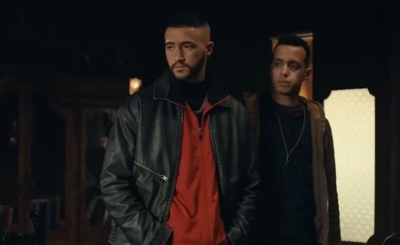Review: Jowan Safadi’s Stay Away From the Mid-Evil East and Sing For It
A look at Jowan Safadi's grand opus of an album.
.jpg)
Countless questions regarding the role of musicians and artists in the Palestinian struggle have arisen over the past few decades, with much of the public sentiment understandably pointing towards them carrying, to some extent, a responsibility to uphold the cause.
However, this stereotype has been shattered by the influential and controversial musician Jowan Safadi. While a statement like this might imply that Jowan is willingly abstaining from taking a political stance with his work, this actually couldn’t be further from the truth.
“I am a human being before I am a Palestinian,” replied Jowan into the microphone when, during a gig at Cairo Jazz Club some five years ago, a girl angrily shouted: “Excuse me, but what is the message from Palestine?” Jowan instead prefers to share views that only stem from his personal experience, without instating himself as a moral or political authority of any sort. With his career starting out around 2000 in Israel’s Beersheba, Safadi sought only to play music, without planning out whom to target his music towards.
In fact Safadi’s first musical undertaking - his band Lenses - is often regarded as the first and only Arab-Jewish group to come out of the Middle East, and yet even that achievement was never intentional or meant as a sort of curated statement - the band just simply fell into place. Needless to say, Lenses found itself hitting their career ceiling fairly quickly, thanks to a lack of acceptance amongst the Israeli mainstream, owing to the band being led by an Arab, and similar intolerance in Palestine owing to the band having Jewish members.
<iframe width="560" height="315" src="https://www.youtube.com/embed/oeJI-CGHWUs" frameborder="0" allow="accelerometer; autoplay; encrypted-media; gyroscope; picture-in-picture" allowfullscreen></iframe>
Following the Second Intifada, Jowan could no longer afford political neutrality, and after Lenses disbanded in 2007, he went on to release his most controversial piece of work yet, Namrud. Released in 2011, the eight-track solo album featured songs like ‘Poor Infidels’, making Jowan the centre of attention in Palestine and the Arab world and eventually leading to his brief detention in Jordan on charges of blasphemy in between performances.
<iframe width="560" height="315" src="https://www.youtube.com/embed/w1UVUgxTM9o" frameborder="0" allow="accelerometer; autoplay; encrypted-media; gyroscope; picture-in-picture" allowfullscreen></iframe>
One would expect that he might slow down after facing hindrances of this calibre, but Jowan took things a step further when he released his provocative single, ‘In the Arms of the Occupation” alongside his band, Fish Samak. Jowan was also the subject of a film by Spanish/Austrian director Fernando Romero, also called Namrud, which explored the father-son relationship between Safadi and his son Don and their heated battles relating to identity, belonging, status quo and freedom.
<iframe width="560" height="315" src="https://www.youtube.com/embed/r8lz-xQFxzs" frameborder="0" allow="accelerometer; autoplay; encrypted-media; gyroscope; picture-in-picture" allowfullscreen></iframe>
On March 22nd of this year, the Haifa-based musician dropped his second solo LP Stay Away From the Mid-Evil East and Sing For It, a name stemming from a twist on an old Arabic saying. The album featured the much anticipated release of 'The Police Song', a track that has been gaining huge traction since it was featured in the Namrud film and during live performances.
<iframe width="560" height="315" src="https://www.youtube.com/embed/oifdSIMe1SY" frameborder="0" allow="accelerometer; autoplay; encrypted-media; gyroscope; picture-in-picture" allowfullscreen></iframe>
'The Police Song' carries a similar message to 'In the Arms of the Occupation', with Safadi exclaiming the fact neither the police, nor judges, nor presidents, are in no position to help their own citizens, but in fact enable and facilitate corruption. The organ clad production suits the song perfectly, with its heavy percussion and dreamy soundscape giving the song an escapist feel.
<iframe width="560" height="315" src="https://www.youtube.com/embed/_TVyZjuowwA" frameborder="0" allow="accelerometer; autoplay; encrypted-media; gyroscope; picture-in-picture" allowfullscreen></iframe>
On the second and third tracks - 'All Conspired Against Us' and 'Father' - Jowan heads into grungier territory akin to his previous releases, while showing a tendency to utilise more electronic sounds. On 'Situation Uneven', meanwhile, Safadi rolls back his Western influences for a stripped down folklore-inspired song. And while it’s quite upbeat, the lyrics explore the mass Arab sentiment of inequality, safety, freedom and bottled anger.
The next song on the album, 'I Wanted To Be', raises the age old idea of living free of labels and allegiances that only lead to conflict. Safadi delivers the song’s moving lyrics with incredible emotion, hovering over the track’s hauntingly minimal and spaced-out production for unrivaled melancholy.
<iframe src="https://open.spotify.com/embed/album/6iMpF8ZtCQ7mZ2IG6WlCnX" width="300" height="380" frameborder="0" allowtransparency="true" allow="encrypted-media"></iframe>
Jowan then carries on in the same melancholic vein lyrically, but chooses to take the uplifting route musically. 'Tired' is as song that seems to be more of an attempt to vent than a story or a statement, and it’s a staggeringly relaxing tune that does a little more than provide food for thought.
Overall this album is no coming of age story or journey. It's the culmination of years of experiences, influences and personal storytelling that come together in one complete piece of work that is a perfect reflection of Jowan as an artist, a Palestinian and ultimately as a human being.
- Previous Article Getting Abyusif
- Next Article 23 Must-Watch Middle Eastern Music Documentaries
Trending This Month
-
Jan 29, 2026
-
Feb 20, 2026






















